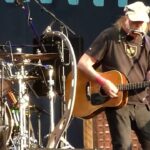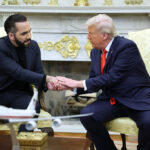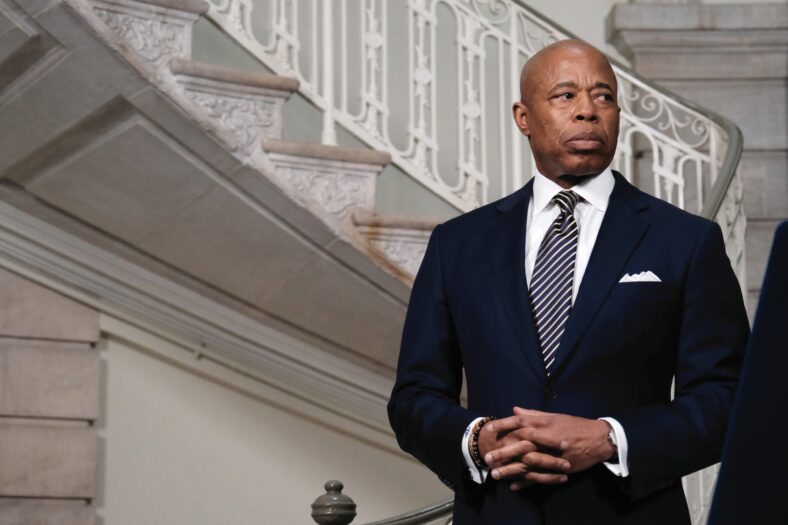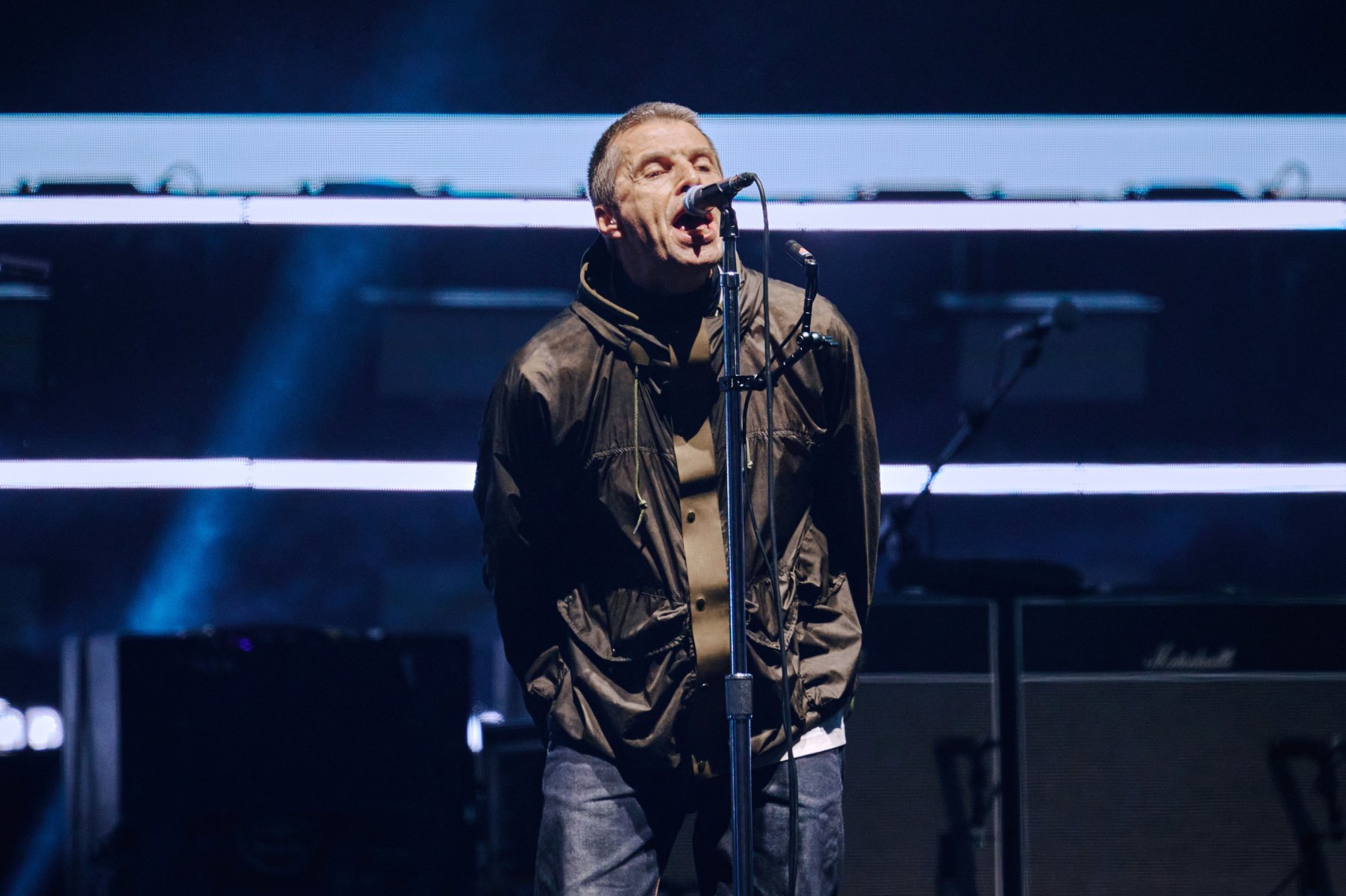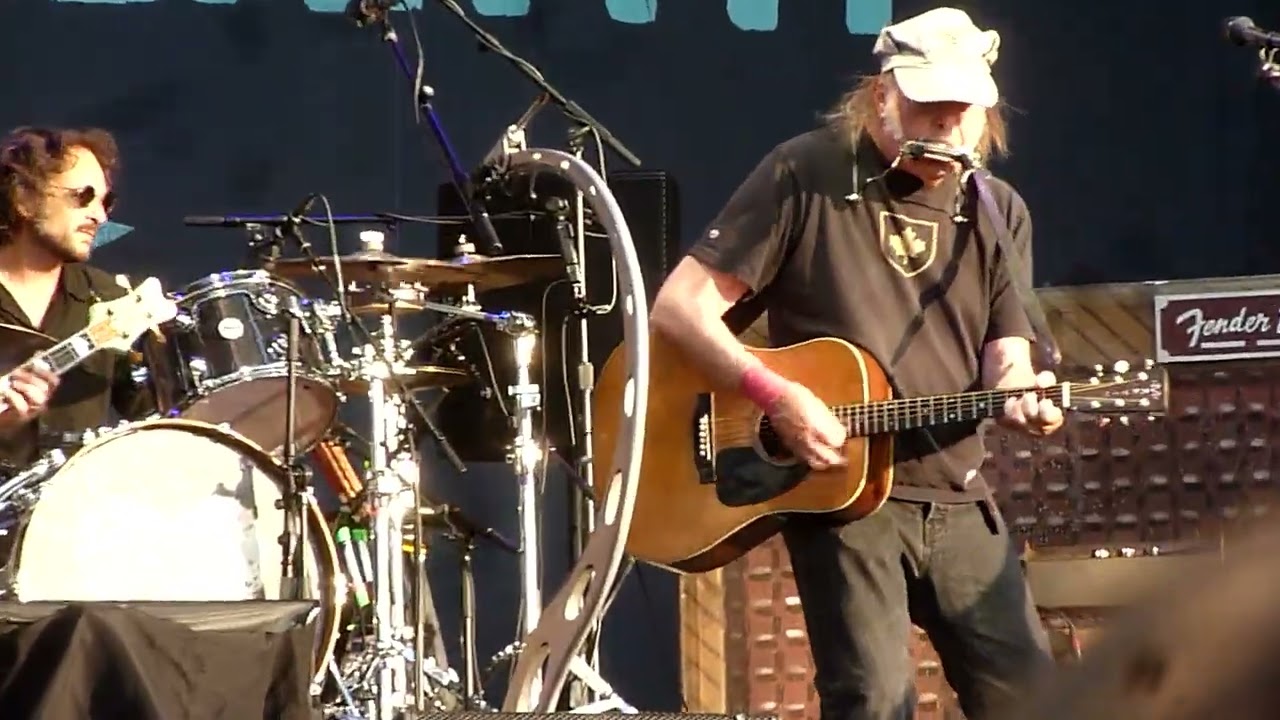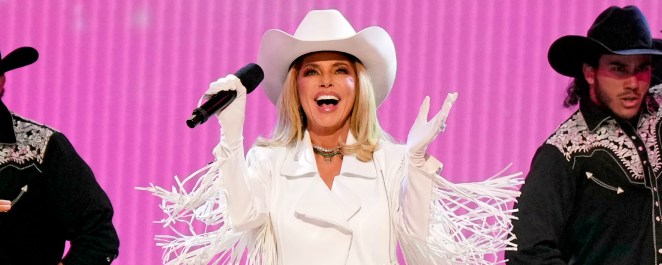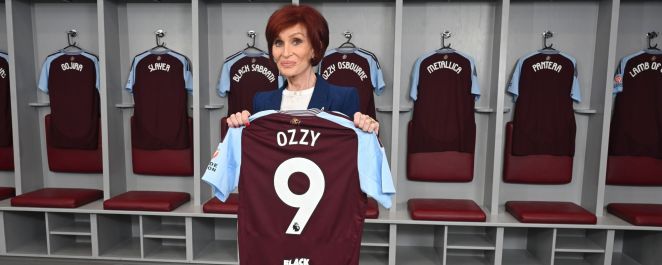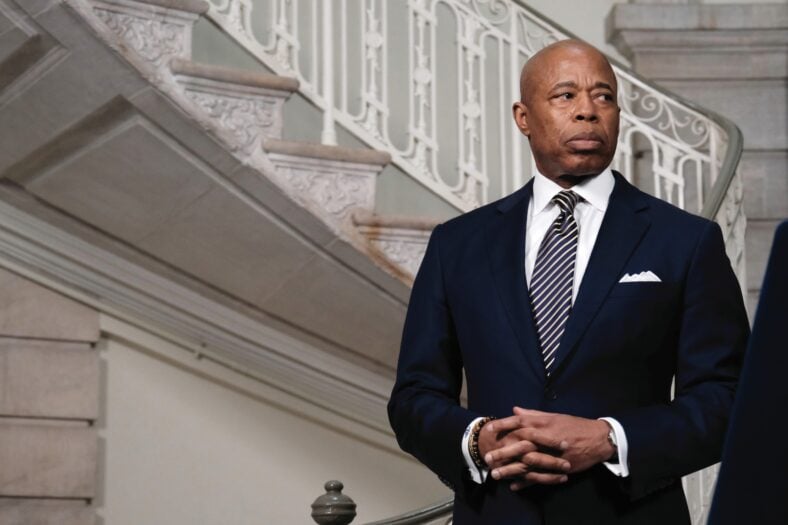
New York City Mayor Eric Adams starts his mornings before most of the city has even hit snooze. He’s meditating, working out, and downing a green smoothie, then diving into a day that might include managing a crisis or boosting New York’s nightlife. For the former cop turned mayor, it’s all part of running the city that never sleeps. Since taking office in 2022, Adams has made public safety the cornerstone of his administration. It’s paid off, he says — shootings and homicides are down, and tourism is back.
But just as important to him are tech innovation and helping the cooks, cleaners, and clerks who keep the city humming. Sure, there have also been controversies, including questions about fundraising and his sometimes combative style. But Adams seems unfazed. As he eyes a second term ahead of the November election—in which he’ll run as an Independent against Democrat Zohran Mamdani and other candidates—Adams is betting that his swagger will keep him in City Hall. Maxim sat down with him to talk about first-term wins, second-term goals, and his advice for tourists.
Tell us about your background.
I grew up working-class in Queens. My mom raised the six of us, mostly on her own. She used to do three jobs to make ends meet so that she was able to buy a modest house, where I spent my childhood. Even- tually, I moved to Brooklyn, joined the police department, and rose to the rank of captain. I spent 22 years with the NYPD, where I was an ad- vocate for police reform. After that, I was elected as the first person of color to be the Brooklyn Borough President and the second person of color to be the mayor of New York City.
What lessons did you learn from being a cop that helped?
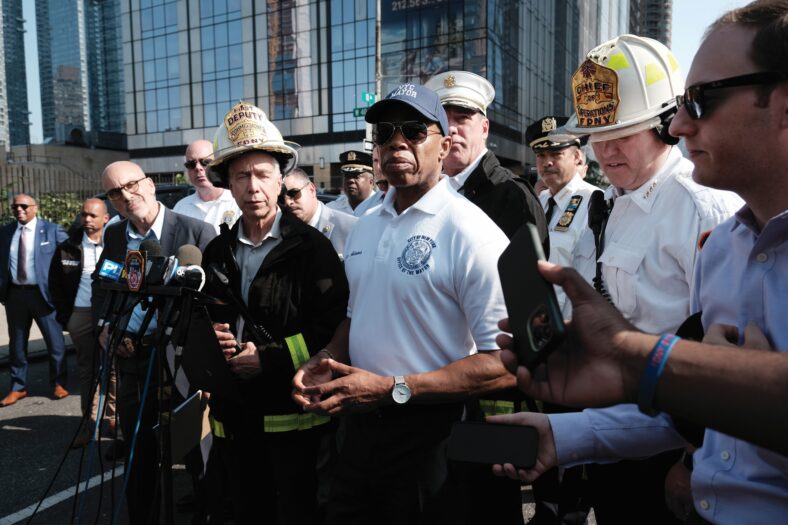
Arch-bishop Desmond Tutu once said, “We spend a lifetime pulling peo- ple out of the river. No one goes upstream and prevents them from falling in in the first place.” Policing shows you all the people who you pull out of the stream downriver. One that inspired me was the 11-year-old young man, who was arrested two or three times in like a week for armed robbery. His dad was serving time for homicide, and his mother was hooked on crack cocaine. He’d been out of school for months, and he was basically raising himself. After that, I knew that instead of just constantly pulling people out of the river, I had to go into government and figure out an upstream way to save them.
Since holding office, what are some of the accomplishments of which you are most proud?
Everyone will tell you the challenge of having just four years. But we were able to turn around the city in three years’ time. When I got elected, COVID was still very pres- ent. Our retail spaces were decimated. No one was in office spaces. Our restaurants were hurting. And we recovered. We have more jobs in New York City than in the city’s history. Our retail industry is booming. Businesses are returning to the city. People are coming back to work. Then we got hit with 230,000 migrants and asylum seekers who didn’t have any place to stay. I was compelled by the federal government to house them, clothe them, feed them, and edu- cate 40,000 children. And we did that. Not one child or family slept on the streets of the City of New York. 80% of those who came here took the next step on their journey. On the economy, bond raters have said it’s remarkable how fast the turnaround actually is. We saw our bond rating increase in my first year. And lastly, crime. We’re the safest big city in America. Last quarter, we had the lowest number of shootings in the recorded history of this city. Second- lowest number of homicides.
How can we stop the weaponization of the political system?
It’s important, particularly for our federal agencies, that we go after in- dividuals who are really creating violence. My hat’s off to this administration and our collaboration with them for going after dan- gerous Venezuelan gangs and dangerous gangs from El Salvador. We took down 27 gang members a few weeks ago. They were sex trafficking, taking documentation from the women, forcing them into prostitution, and they were dealing with guns and violence. So I think we should partner with all of our federal authorities in mak- ing our city safe. President Biden stated that his Justice Depart- ment became too political. Not only did he see what happened with his family, but he saw what happened with me and President Trump. This should not have happened to Americans.
What are the goals you’d like to achieve in your second term?
It starts with public safety. That’s the foundation. And I’m going to continue making this city not just the safest big city, but the safest city in America. We need to use technology to run the city more ef- ficiently. We should be looking at blockchain to manage records and cyber wallets, so we’re not using paper checks. Government needs to get out of the way of business to let it thrive.
What does a typical Mayor Adams day entail?
I get up early, meditate, do my prayers, and do breathing exercises— the Wim Hof Method. Then I exercise. Drink a green smoothie with some berries, some collard greens, and a little cacao powder. I read five or six of the papers so I can get started for the day. This is a city where anything and every- thing can happen on any given day — a plane could land on the Hudson River, a helicopter could fall apart, some type of incident could occur — so you have to be ready. Not only physically, but mentally. At night, I make sure I’m at the private clubs. I talk to the cooks, the dishwashers, the waiters, and tell them thank you, because those are our everyday, hardworking, working-class people. Our nightlife is a $30 billion industry. It’s crucial that it continues to thrive.
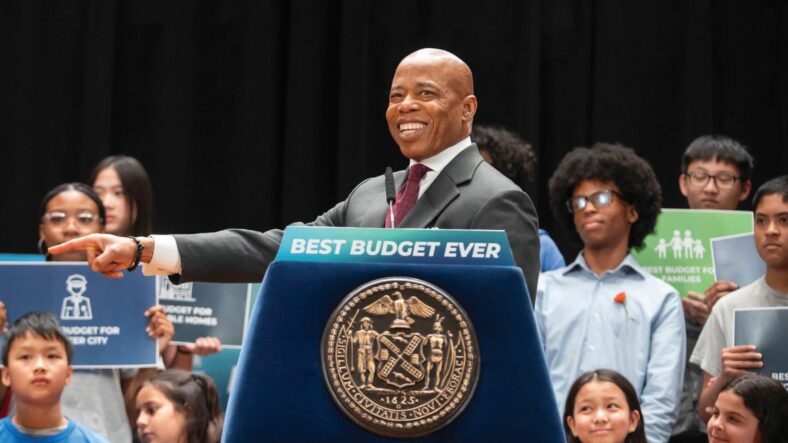
I’m big on making sure our economy runs on all shifts. I learned that from policing — there’s a morning tour, an afternoon tour, and an overnight tour. The city works the same way. We have a morning economy — people heading to the office. An afternoon economy — people out for lunch. And an evening and overnight economy — people socializing and de-stressing. I need to be present in each of those economies to motivate people to do what I tell every tourist: Leave the city with as few dead presidents in their pockets as possible.
Bike lanes changed the game in NYC, but not without controversy. Why keep expanding them?
New Yorkers take it personally when you inconvenience them. So you have to find a balance. When it comes to bike lanes, we know we have to deal with congestion. It’s a real issue in the city. It’s impacting our economy. And we know we have to deal with the environment. Those ice caps that are melting at the poles are real. So we need real balance. I’ve built out bike lanes where they should be, but I push back on those who think we should get rid of every car in the city. I don’t believe in that. We need a healthy mix.
What’s your advice to young people thinking about getting into politics?
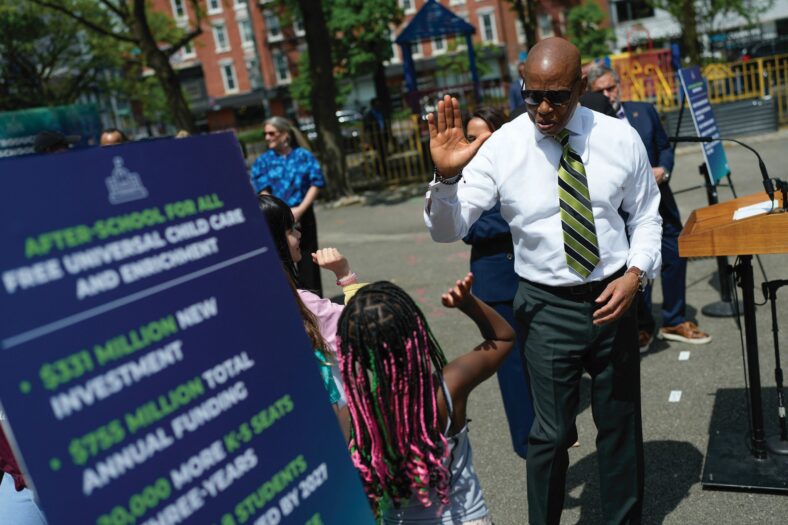
Ignore the noise. The most important thing is to be true to yourself. In a city like New York, with 8.5 million people and 35 mil- lion opinions, if you try to satisfy everyone, you’ll get nothing done. Be clear on your North Star, and move toward it. You know if you’re doing a good job. You know if you’re delivering for the people.
Everyone wants to be the mayor, but they don’t want to do what it takes to get there. There have only been 110 mayors in the history of New York City. I’m one of them. There will always be naysayers. That’s part of the job. New Yorkers have five fingers, but they love that middle one the most. You have to be thick-skinned. I learned that in policing, people cursed at me, yelled at me, called me names — and I still did my job.
What recommendations would you give to people visiting NYC for the first time?
Go beyond the beaten path. Don’t just stick to Times Square or the Statue of Liberty. Explore neighborhoods that reflect your own background —Little Haiti, Little Italy, China- town, or Little Bangladesh. I encourage people: first, go seek out something connected to your roots. Then go explore everything else this city has to offer.
This article originally appeared in the Summer 2025 issue of Maxim magazine.



